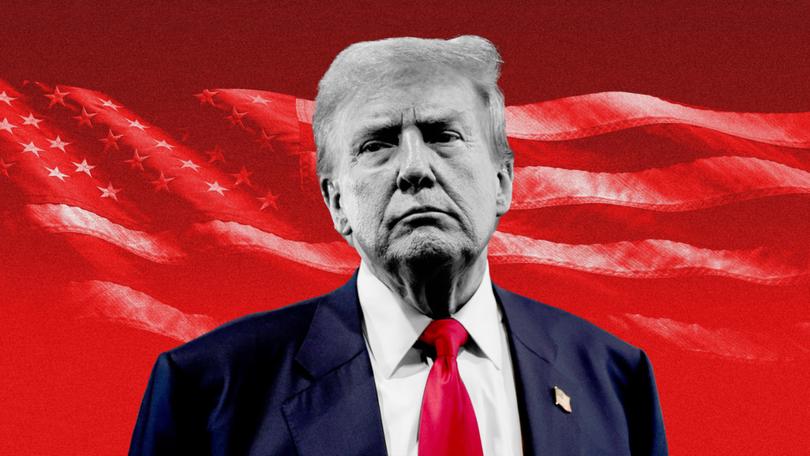THE NEW YORK TIMES: How to survive the Donald Trump years with your spirit intact
THE NEW YORK TIMES: I had forgotten how exhausting it is to live in Donald Trump’s world. He’s not only a political figure. He creates a psychological and social atmosphere that suffuses the whole culture.

I had forgotten how exhausting it is to live in Donald Trump’s world. He’s not only a political figure. He creates a psychological and social atmosphere that suffuses the whole culture — the airwaves, our conversations, our moods.
If there is one word to define Trump’s atmosphere, it is “pagan.” The pagan values of ancient Rome celebrated power, manliness, conquest, ego, fame, competitiveness and prowess, and it is those values that have always been at the core of Trump’s being — from his real estate grandiosity to his love of pro wrestling to his king-of-the-jungle version of American greatness.
The pagan ethos has always appealed to grandiose male narcissists because it gives them permission to grab whatever they want. This ethos encourages egotists to puff themselves up and boast in a way they find urgently satisfying; self-love is the only form of love they know.
Sign up to The Nightly's newsletters.
Get the first look at the digital newspaper, curated daily stories and breaking headlines delivered to your inbox.
By continuing you agree to our Terms and Privacy Policy.The pagan culture is seductive because it lures you with images of heroism, might and glory. Think of Achilles slaughtering his enemies before the walls of Troy. For a certain sort of perpetual boy, what could be cooler than that? But there is little compassion in this worldview, no concept that humility might be a virtue. There is a callous tolerance of cruelty.
Tom Holland is a historian who wrote several fine books of classical history, including “Persian Fire.” Gradually, he became more and more appalled by many of those ancient pagans — those Caesars who could slaughter innocent humans by the hundreds of thousands while everyone thought this was totally fine.
“This is a really terrifyingly alien world, and the more you look at it, the more you realise that it is built on systematic exploitation,” Holland told writer Justin Brierley. “In almost every way, this is a world that is unspeakably cruel to our way of thinking. And this worried me more and more.”

The callous tolerance of cruelty is a river that runs through human history. It was dammed up, somewhat, only by millennia of hard civilisational work. The pagan ethos — ancient or modern — always threatens to unleash brutality once again. The pagan ethos does not believe that every human was made in the image of God, does not believe in human equality, is not concerned about preserving the dignity of the poor. It does not care much about the universal feelings of benevolence, empathy and faithfulness toward one another, which, it turns out, are absolutely required for a democracy to function.
We seem to be entering a pagan century. It’s not only Trump. It’s the whole phalanx of authoritarians, all those greatness-obsessed macho men such as Russian President Vladimir Putin and Chinese President Xi Jinping. It’s the tech bros. It’s Christian nationalism, which is paganism with worship music. (If you ever doubt the seductive power of paganism, remember it has conquered many of the churches that were explicitly founded to reject it.)
If paganism is a grand but dehumanising value system, I’ve found it necessary, in this increasingly pagan age, to root myself in anything that feels rehumanising, whether it’s art or literature or learning. I’ve found it incredibly replenishing to be spending time around selfless, humble people who are still doing the work of serving the homeless, mentoring a lost kid who has joined a gang. These days, I need these moral antidotes to feel healthy, resilient and inspired.
In his book “The Year of Our Lord 1943,” Alan Jacobs shows how many people during World War II felt the exact same impulse. With the bomb blasts of savagery growing greater in their ears, people such as C.S. Lewis and University of Chicago President Robert Maynard Hutchins recommitted themselves to humane education, to the task of raising generations that would never again fall for the strongman’s seductive promise of domination. That era eventually produced a golden age of public theology — Reinhold Niebuhr, Abraham Joshua Heschel, the Rev. Martin Luther King Jr. — and so much else.
Many great moral traditions have always stood against paganism and rebutted it. If paganism stands for manly dominance, Judaism, for example, stands for piety, learning and strictness of conscience. Think of the words so highly valued in Jewish life: chesed (loving kindness), simcha (joy, especially communal joy), anavah (humility), tzedek (justice and charity), limud (study and learning) and kedushah (holiness). Those words lift us up to an entirely different moral realm.
For the Romans, the cross was a symbol of their power — their power to crucify. The early Christians took the cross as their symbol, too, but as a symbol for compassion, grace and self-sacrificial love. Christianity is built on a series of inversions that make paganism look pompous and soulless: Blessed are the meek. Blessed are the poor in spirit. The last shall be first. The poor are closer to God than the rich. Jesus was perpetually performing outrageous acts of radical generosity, without calculating the cost.
The Judeo-Christian ethos showed the world something loftier than paganism. As G.K. Chesterton put it in “The Everlasting Man,” “One of the strange marks of the strength of Christianity is that, since it came, no pagan in our civilisation has been able to be really human.”
Judaism and Christianity confront paganism with rival visions of the good. The contrast could not be starker. Paganism says: Make yourself the centre of the universe. Serve yourself and force others to serve you. The biblical metaphysic says: Serve others, and you will find joy. Serve God, and you will delight in his love.
You may be a person of faith or a person of no faith, but which moral atmosphere do you want to live in? The cultural atmosphere you immerse yourself in will slowly form who you are. I don’t fault those pagans for sucking down all those muscle-building diet supplements, but I know the kind of nourishment I need these days for the strength of my mind and the health of my soul.
Apparently, I’m not alone. Something’s going on in our culture. The decline of religious participation, which was so rapid between 2010 and 2020, seems to have stopped. There has been a relative surge in religious interest among young men. According to research by evangelical Christian polling group Barna, 66% of Americans say they have made a personal commitment to Jesus — a 12-percentage-point jump since 2021.
Similar things may be happening in Europe. In France, the Catholic Church saw a 45% increase in new catechumens this past Easter compared with last year, and it has baptized more than 17,000 people, the highest yearly number of entrants in more than 20 years. According to an April report by the Bible Institute, the percentage of British adults age 18-24 who attend church at least monthly increased to 16% today from 4% in 2018, including a 21% gain among young men. I’ve been predicting a revival among the religious left, but that seems not to be happening. The Christian resurgence in Britain is not among the progressive mainline denominations; it’s primarily among Catholics and Pentecostals, with 2 million more people attending church than six years ago.
In his book “The Surprising Rebirth of Belief in God,” Brierley notes that the New Atheists were all the rage several years ago, but now, it’s unlikely believers such as Ayaan Hirsi Ali, Jordan Peterson and rock star Nick Cave. Vanity Fair recently ran a story headlined “Christianity Was ‘Borderline Illegal’ in Silicon Valley. Now It’s the New Religion.”
This movement was already underway before Trump was elected to a second term. It’s a response to a series of gods that failed: The belief that science and tech could solve our quest for meaning. The belief that we can live like hyperindividualists and still experience a sense of communal belonging. The belief that the right body mass index could lead to purpose and peace.
Are we on the cusp of a new religious revival? The evidence is still much too flimsy and fresh to justify that kind of sweeping assertion, so color me skeptical. I think it’s more accurate to say that there is currently a great spiritual yearning in the populace, which the religious institutions have not yet risen to meet.
But I do think we’re on the cusp of a great cultural transition. On the one hand, the eternal forces of dehumanisation are blowing strong right now: concentrated power; authoritarianism; materialism; runaway technology; a presidential administration at war with the arts, universities and sciences; a president who guts Christianity while pretending to govern in its name.
On the other hand, there are millions of humanists — secular and religious — repulsed by what they see. History is often driven by those people who are quietly repulsed for a while and then find their voice. I suspect different kinds of humanists will gather and invent other cultural movements. They will ask the eternal humanistic questions: What does it mean to be human? What is the best way to live? What is the nature of the common humanity that binds us together? As these questions are answered in new ways, there will be new cultural movements and forms.
As theologian Dallas Willard put it, there has been, over the past decades of neglect, a loss of moral knowledge. We came to a spot in 2024 in which 77 million Americans took a look at Trump’s moral character and didn’t have a problem with what they saw. But the consequences of those character failings are becoming evident in concrete ways.
New winds are going to blow.
This article originally appeared in The New York Times.
© 2025 The New York Times Company
Originally published on The New York Times
